The San Jose Sharks are in a good spot. They have pushed themselves to the top of the Pacific Division in time for the Christmas break. Further, they have added two rookie forwards to the roster and both are panning out.
While the Sharks are in a good spot, there is a fly in the ointment. It is the salary cap. Currently, Tomas Hertl is on long-term injured reserve (LTIR). LTIR provides salary cap space relief to the Sharks. When Hertl returns to health, though, the LTIR relief ends. At that time, salary cap constraints will make it problematic for San Jose to keep the current roster together.
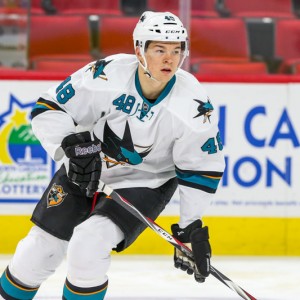
There are ways to finesse the cap issue, such as only rostering 21 or 22 players instead of 23. Hertl could be kept on LTIR a bit longer than necessary. Given the history with his knee, it might be wise to error on the side of extreme caution. Before Hertl is ready to return, other players could find themselves injured and on LTIR. This could provide the needed cap relief, albeit in the least desirable manner.
The most likely way for San Jose to address their cap space constraint is through a trade. Fortunately, they have opportunities to “sell high”. Perhaps no better words can be spoken about a mid- or low-level trade candidate than “defensively responsible”. San Jose is perhaps the most defensively responsible team in the league. They give up few goals, have a good penalty kill and take few penalties.
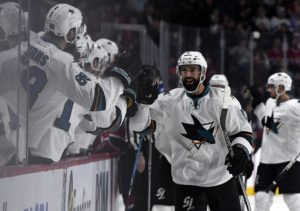
To further trade speculation, the Sharks scratched defenseman David Schlemko in back-to-back games in favor of Dylan DeMelo. Schlemko has been perhaps their most effective defenseman this season not selected for Team Canada (ie, not Brent Burns or Marc-Edouard Vlasic). There are many potential reasons for benching Schlemko, but none are of the routine sort. Especially given the most recent benching came against Edmonton in a game for the division lead.
Schelmko’s benching did not seem like an extra day to heal from bumps and bruises nor did it seem like a case of the coach needing to send a message to a player whose game is slipping. Trade speculation moved quickly to DeMelo, as he seemed to be the player being showcased in Schlemko’s absence. Though I doubt DeMelo is a trade target, for the right price, pretty much any player can get traded.
Trade Considerations
In looking at trade candidates, two things stand out. First, there are players who, at least to some degree, play similar roles. Players with niche skills, such as Micheal Haley (the team’s lone enforcer), are less likely to be moved. Players with similar profiles to their teammates, though, are more likely to be traded.
The second consideration is the previously mentioned ‘fly in the ointment’, the salary cap. San Jose will consider players who provide enough cap relief to enable the rest of the roster to remain intact. The Sharks may also want to add cap space for trades later in the season, meaning players with mid-tier cap hits may be on the market.
The Top Trade Candidates
Matt Nieto (cap hit: $735,000)
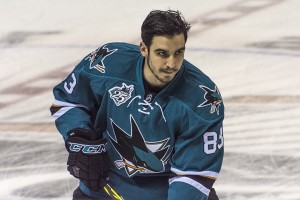
Nieto has been at a crossroads for a long time, but with the emergence of rookies Timo Meier and Kevin Labanc, it seems Nieto’s time is up. Unfortunately for San Jose, Nieto is unlikely to bring much of a return.
He is often cited as among the fastest Sharks skaters. In a league with an increased premium on speed, Nieto should find a home. Still, speed is only a major asset if other parts of the game are strong, and in Nieto’s case, they simply are not strong enough to warrant a roster spot on a deep Sharks team. The problem with moving Nieto, though, any cap space created will likely be filled by a player with a similar cap hit. Moving Nieto might be best for all concerned, but it will not solve the salary cap issue for San Jose.
Justin Braun (cap hit: $3.8 million)
Discussed at length in a prior piece, Braun represents the best “sell high” candidate. The upcoming expansion draft is a significant influence in Braun’s appearance on this list. The detailed arguments are in this linked article. There are three core arguments. First, this creates cap space. Second, Braun may wind up going elsewhere in the expansion draft at the end of the season. Third, he is likely to bring excellent value in a trade. This could be a case of getting something significant now versus nothing later. In any other year, moving Braun would be unlikely. This year, it has to be a consideration.
Tommy Wingels (cap hit: $2.475 million)
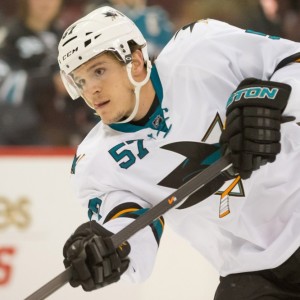
Wingels struggled last season, but has been effective as the mainstay of the fourth line this season. Despite only six points from Wingels, the fourth line has held its own this season, and has often been genuinely good. Wingels is even on the year. Among the players he’s shared fourth line duties with are Melker Karlsson (plus-5), Micheal Haley (minus-1), Chris Tierney (minus-4) and Nieto (minus-3). Added up, the fourth line is roughly even on the season, which means it is a successful fourth line. Wingels is on this list for only one reason, he can give San Jose the cap space breathing room they sorely need. Given the quality of his play this season, he should get a reasonable return.
Joel Ward (cap hit: $3.275 million)
Ward has been a mixed bag for the Sharks. Over his career, Ward has made his mark in the postseason. Last season was no different, as he played a key role in San Jose’s postseason success. But the regular season has been a different story. Last season, his plus-minus was among the worst on the team. This year, Ward has just two goals in nearly 500 minutes of ice time. Ward offers a bigger body to play a heavier game. He offers a veteran presence. Some teams lack in these areas. But with physical young forward Timo Meier up with the Sharks and likely to stick, Ward’s physical play is less critical. His veteran leadership and playoff success matter, but San Jose has a remarkable amount of playoff experience on a veteran-filled roster.
Ward’s contract isn’t cheap, and at age 36, the combination of age and contract size might cause some teams to balk at making a deal. Still, the qualities Ward brings are desirable, especially his playoff success. Ward ‘s departure would not leave a major void in San Jose, but he could fill a major void on other teams.
Mikkel Boedker (cap hit: $4.0 million)
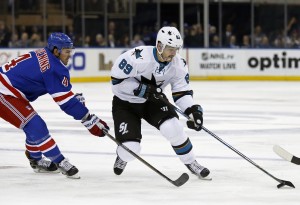
Thirty-plus games into the first season of a four-year deal, Boedker has not panned out as expected. The talent may be there, the results haven’t been. There is plenty of time for things to turn around for Boedker and there are signs his game is coming around. I’m doubtful the Sharks will move Boedker so early in his time here, but his absence might be among the least disruptive, given the success of Labanc and early results from Meier. Recouping a sizable chunk of cap space can open up additional opportunities for a trade-deadline addition. Still, Boedker appears to be one of the few “sell low” candidates the Sharks have to offer.
Zeke’s Notes
While it’d make a great storyline, the chances of Patrick Marleau scoring career goal 500 on career assist 1,000 from Joe Thornton are getting slim. Marleau sits just ten goals from 500 while Thornton is a mere 15 assists from 1,000. At his current pace, Marleau is on track to get career goal 500 late this season, while Thornton is likely to earn his milestone sometime in February. Of course, if Marleau gets on a goal-scoring streak in the not too distant future, the chances of the two milestones happening concurrently will go way up.